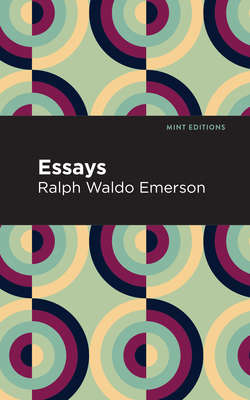Essays

Реклама. ООО «ЛитРес», ИНН: 7719571260.
Оглавление
Ralph Waldo Emerson. Essays
CONTENTS
PUBLISHER’S NOTE. Life of Emerson
Critical Opinions of Emerson and his Writings
Chronological List of Emerson’s Principal Works
THE AMERICAN SCHOLAR
COMPENSATION[93]
SELF-RELIANCE
FRIENDSHIP[278]
HEROISM[309]
MANNERS[367]
GIFTS[456]
NATURE[469]
SHAKSPEARE;[525] OR, THE POET
PRUDENCE[660]
CIRCLES[690]
NOTES. The American Scholar
Compensation
Self-Reliance
Friendship
Heroism
Manners
Gifts
Nature
Shakespeare; or, the Poet
Prudence
Circles
A NOTE ABOUT THE AUTHOR
Отрывок из книги
Ralph Waldo Emerson
After graduating from college he taught school for a time, and then entered the Harvard Divinity School under Dr. Channing, the great Unitarian preacher. Although he was not strong enough to attend all the lectures of the divinity course, the college authorities deemed the name Emerson sufficient passport to the ministry. He was accordingly “approbated to preach” by the Middlesex Association of Ministers on October 10, 1826. As a preacher, Emerson was interesting, though not particularly original. His talent seems to have been in giving new meaning to the old truths of religion. One of his hearers has said: “In looking back on his preaching I find he has impressed truths to which I always assented in such a manner as to make them appear new, like a clearer revelation.” Although his sermons were always couched in scriptural language, they were touched with the light of that genius which avoids the conventional and commonplace. In his other pastoral duties Emerson was not quite so successful. It is characteristic of his deep humanity and his dislike for all fuss and commonplace that he appeared to least advantage at a funeral. A connoisseur in such matters, an old sexton, once remarked that on such occasions “he did not appear at ease at all. To tell the truth, in my opinion, that young man was not born to be a minister.”
.....
I read with some joy of the auspicious signs of the coming days, as they glimmer already through poetry and art, through philosophy and science, through church and state.
One of these signs is the fact that the same movement[80] which effected the elevation of what was called the lowest class in the state assumed in literature a very marked and as benign an aspect. Instead of the sublime and beautiful, the near, the low, the common, was explored and poetized. That which had been negligently trodden under foot by those who were harnessing and provisioning themselves for long journeys into far countries, is suddenly found to be richer than all foreign parts. The literature of the poor, the feelings of the child, the philosophy of the street, the meaning of household life, are the topics of the time. It is a great stride. It is a sign—is it not?—of new vigor when the extremities are made active, when currents of warm life run into the hands and the feet. I ask not for the great, the remote, the romantic; what is doing in Italy or Arabia; what is Greek art, or Provençal minstrelsy; I embrace the common, I explore and sit at the feet of the familiar, the low. Give me insight into to-day, and you may have the antique and future worlds. What would we really know the meaning of? The meal in the firkin; the milk in the pan; the ballad in the street; the news of the boat; the glance of the eye; the form and the gait of the body;—show me the ultimate reason of these matters; show me the sublime presence of the highest spiritual cause lurking, as always it does lurk, in these suburbs and extremities of nature; let me see every trifle bristling with the polarity that ranges it instantly on an eternal law;[81] and the shop, the plow, and the ledger referred to the like cause by which light undulates and poets sing;—and the world lies no longer a dull miscellany and lumber-room, but has form and order: there is no trifle, there is no puzzle, but one design unites and animates the farthest pinnacle and the lowest trench.
.....